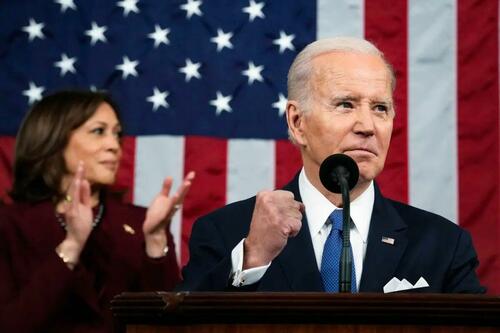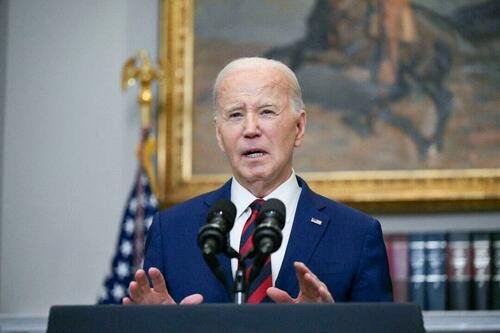Authored by Tom Ozimek via The Epoch Times (emphasis ours),
The Biden administration has issued a new rule that makes it harder to fire government employees in an apparent bid to thwart former President Donald Trump’s pledge to fire “rogue bureaucrats” and radically reshape the federal workforce.
The new rule, which bolsters job protections for career civil servants, was issued on April 4 by the U.S. Office of Personnel Management (OPM), which hinted in a statement that it’s targeting a promised move by a potential second Trump presidency to “drain the swamp and root out the deep state” by making it easier to fire government workers.
“In the first week of the Biden-Harris Administration, President Biden revoked an Executive Order issued by the previous Administration that risked altering our country’s long-standing merit-based civil service system, by creating new excepted service schedule, known as ‘Schedule F,’ and directing agencies to move potentially large swathes of career employees into this new excepted service status,” OPM said in the statement.
This is in reference to a Trump-era executive order issued in 2020 that allowed tens of thousands of the 2.2 million federal employees to be reclassified as political appointees, making it easier to fire them.

‘Root Out the Deep State’
Roughly 4,000 federal employees are now considered political appointees, who typically change with each administration, with the revival of a Schedule F potentially increasing that more than tenfold.
President Joe Biden nixed the Schedule F order when he took office, while President Trump said in mid-2022 that he would try to revive the concept in one form or another.
“We need to make it much easier to fire rogue bureaucrats who are deliberately undermining democracy or at a minimum just want to keep their jobs,” President Trump said in a speech at the America First Policy Institute on July 26, 2022, promising to “drain the swamp and root out the deep state.”
The former president went further in his speech, calling on Congress to pass laws that would give the commander-in-chief the authority to fire any government employee basically at will.
“Congress should pass historic reforms empowering the president to ensure that any bureaucrat who is corrupt, incompetent, or unnecessary for the job can be told ‘you are fired, get out,’” he said, adding that, after such reforms, Washington would be an “entirely different place.”
Later on the campaign trail, President Trump repeatedly hinted at his intention to make good on this promise. His remarks dovetail with a long-standing desire on the part of many Republicans to prune what they say is a bloated, inefficient and, in many cases, counterproductive federal bureaucracy.
Many Democrats, on the other hand, see the potential revival of a Schedule F or similar initiative as a threat to the operations of government and a potential disruption to the provision of critical services.
“This final rule honors our 2.2 million career civil servants, helping ensure that people are hired and fired based on merit and that they can carry out their duties based on their expertise and not political loyalty,” OPM Director Kiran Ahuja said in a statement.
“The Biden-Harris Administration is deeply committed to the federal workforce, as these professionals are vital to our national security, our health, our economic prosperity, and much more.”

The new rule, which is nearly 240 pages long, apparently seeks to put up a roadblock to prevent President Trump, or anyone else for that matter, from issuing another executive order that would reclassify civil servants.
The White House didn’t respond to a request for comment by press time.
Trump campaign spokesperson Karoline Leavitt pointed to President Trump’s Agenda 47 plan to “dismantle the deep state and return power to the American people,” which includes an explicit pledge to re-issue the 2020 executive order, “wield that power aggressively,” and “fire rogue bureaucrats.”
What’s in the New Rule?
The rule, which is being published in the federal registry and is set to take effect next month, is poised to counter a future Schedule F executive order by entrenching the status and civil service protections accrued by federal employees.
It stipulates that the job protections accrued by a government worker cannot be taken away by an involuntary move from the competitive service (appointments that are subject to OPM hiring rules and pay scales) to the excepted service (appointments that follow a separate, often more streamlined hiring process).
Similarly, moves from one excepted service schedule to another would not strip federal employees of those protections under the new rule.
“Once a career civil servant earns protections, that employee retains them unless waived voluntarily,” the OPM said in a statement.
The rule also makes clear that policymaking classifications apply to noncareer and political appointments and cannot be applied to career civil servants.
Specifically, the new rule stipulates that the phrase “confidential, policy determining, policymaking, or policy-advocating” positions (which describe positions lacking civil service protections) can be used to refer only to noncareer, political appointments and may not be applied to career civil servants to strip them of protections.
The final rule also establishes new procedural requirements for moving positions from the competitive service to the excepted service and within the excepted service. In particular, it creates an appeals process for federal employees when any such movement is involuntary and involves stripping workers of their civil service protections.
“This final rule builds on three years of the Biden-Harris Administration’s efforts to strengthen federal agencies and the federal workforce,” OPM Deputy Director Rob Shriver said in a statement.
The agency said it had reviewed more than 4,000 comments submitted during the public comment period as part of the rulemaking process.